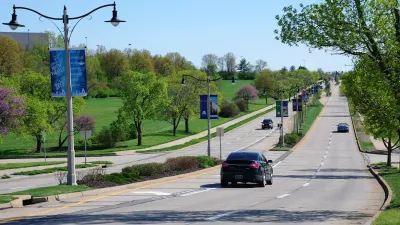At a unique, combined meeting of two regional agencies, planners in the San Francisco Bay Area proposed several transportation pricing strategies to reduce global warming.
"The plan was presented as a jumping-off point for a lengthy process, ending in February 2009, of creating the (Metropolitan Transportation Commission's) federally-mandated regional transportation plan through 2035. It was presented to several hundred Bay Area leaders at the "Bay Area on the Move" MTC transportation summit and Association of Bay Area Governments fall general assembly."
"Probably the most controversial component will come from making motorists pay for their contributions to rush-hour congestion. That five-fold increase would come from peak-hour surcharges on parking, congestion fees to enter urban areas and a 23-cents-a-mile carbon tax would provide an incentive to carpool, take transit or work from home.
It's designed to scare the dickens out of every elected official in the room," Heminger quipped to the gathering of leaders from all over the 9-county Bay Area.
"Another key component to reaching emissions targets will be coming up with a unified plan to channel development toward job centers, toward public transportation hubs and away from the tradition of sprawling suburbs ever farther from those key locations."
"FOCUS, short for Focusing Our Vision, is a regional incentive-based development and conservation strategy for the Bay Area. Regional agencies address climate change, transportation, housing, the economy, and other issues that transcend city boundaries but impact all members of the Bay Area" [from FOCUS handout].
FULL STORY: Plan: Make Bay Area drivers pay for warming

Planetizen Federal Action Tracker
A weekly monitor of how Trump’s orders and actions are impacting planners and planning in America.

USGS Water Science Centers Targeted for Closure
If their work is suspended, states could lose a valuable resource for monitoring, understanding, and managing water resources.

End Human Sacrifices to the Demanding Gods of Automobile Dependency and Sprawl
The U.S. has much higher traffic fatality rates than peer countries due to automobile dependency and sprawl. Better planning can reduce these human sacrifices.

Trump: Federal Government Won’t Pay for California HSR
The President has targeted federal funding for the California bullet train project since his first administration.

San Francisco Enhances Urban Planning Initiatives with Green Infrastructure
San Francisco incorporates green infrastructure in its city development initiatives, elevating the importance of sustainability in urban planning.

Chicago Approves Green Affordable Housing Plan
The Mayor’s plan calls for creating a nonprofit housing corporation tasked with building affordable housing that meets Green Building standards.
Urban Design for Planners 1: Software Tools
This six-course series explores essential urban design concepts using open source software and equips planners with the tools they need to participate fully in the urban design process.
Planning for Universal Design
Learn the tools for implementing Universal Design in planning regulations.
Tyler Technologies
New York City School Construction Authority
Village of Glen Ellyn
Transportation Research & Education Center (TREC) at Portland State University
Chaddick Institute at DePaul University
Institute for Housing and Urban Development Studies (IHS)
Regional Transportation Commission of Southern Nevada
Toledo-Lucas County Plan Commissions


























